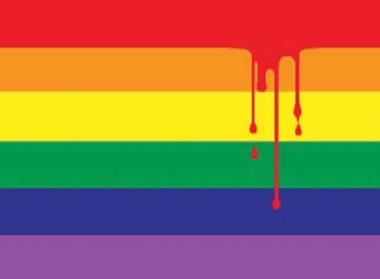Hate violence – a serious problem for LGBTQ people

by Rob Howard
Associate Editor
Eva Wood, the director of OutFront Minnesota’s anti-violence program, puts hate crimes and hate violence against LGBTQ people in perspective. “Most forms of oppression are interrelated,” she told The Gayly. “Anti-LGBTQ violence and violence against women are intertwined. On a macro level it is caused by the societal norms of heterosexism.”
The incidence of hate violence and hate crimes against LGBTQ people is alarming. In 2014, the last year for which statistics are available, there were 1,201 victims of hate crimes against LGBTQ persons, according to the FBI. In addition, there were 109 victims, based on gender identity or gender non-conforming people.
As shocking as these statistics are, what is more shocking is that only 13.3 percent of 13,022 participating law enforcement agencies reported any hate crime data in 2012. In 2013, the National Coalition of Anti-Violence Programs (NCAVP) documented 2,001 survivors and victims; the FBI reported only 1,376.
These statistics suggest that, given the difference in these numbers, there are far more hate crimes against LGBTQ people than we know about. In The Gayly’sregion, for 2014, Arkansas reported one anti-LGBTQ hate crime, Kansas reported 10, Missouri 13, Oklahoma 10, and Texas 40.
The Communications Director for the New York City Anti-Violence Project pointed out that the actual number of acts of hate violence is undoubtedly far more than even the NCAVP statistics indicate, because they only receive reports from their member organizations. In addition, there is a difference between a hate crime, and hate violence. Hate crime is a legal definition, and includes crimes against property and against persons, motivated by bias. Hate violence is violence against a person motivated by bias.
In The Gayly’s region, only Kansas City has an LGBTQ anti-violence project, although the Kansas City Anti-Violence Project (KCAVP) provides its services throughout Missouri and Kansas. Missouri is the only state in this region that has a hate crime law that covers both sexual orientation and gender identity.
KCAVP’s James Moran told The Gayly some of the problems they encounter, giving as an example that, “People are denied a bed in a domestic violence shelter; trans people are questioned about their genitals when all they are looking for is a safe place to sleep.” He pointed out that there are far fewer beds for men in domestic violence shelters than there are for women.
KCAVP provides direct services in the Kansas City metro area, and works with partners in the out-lying areas. In some cases, they will arrange for clients to travel to the city for their services. Services provided, according to Moran, include, “Education and training to service providers and schools. We also provide education in Iowa and Nebraska.
“[We provide] immediate crisis intervention, case management and advocacy, accompanying a person to a medical exam if they want that, free therapy services for up to 10 sessions, and emergency assistance, for example, with housing.”
Moran said, “If a client doesn’t feel safe going home, we make every effort to ensure they have a safe place to stay,” even if it means paying for a few nights in a hotel.
Kansas and Texas hate crime laws cover sexual orientation, but not gender identity. Oklahoma’s law covers neither. Arkansas has no hate crime law. Other than KCAVP there are no specific LGBTQ anti-violence programs in the region.
OutFront Minnesota’s anti-violence programs is one of the most robust in the country. Its efforts include a crisis line, individual counseling, court accompaniment and other forms of advocacy support, community based support groups and community education/outreach.
Wood said, “Masculinity creates hate and fear of transgender women, and particularly for trans Women of Color. Transgender people, although only a small segment of our community, face a wildly disproportionate level of violence.”
She said, “There is a lot of understandable mistrust on the part of victims. We work with agencies to overcome those barriers.”
Training of first responders, law enforcement and health care providers was stressed by both Moran and Wood as being extremely important in helping the response to hate violence that LGBTQ people experience.
The NCAVP stresses that if violence happens to you it is not your fault. They encourage people to have a safety plan, and to keep their friends advised of where they are going and what they are doing.
The people working against violence are dedicated professionals, with a vision. Wood said, “I feel really lucky to do the work that I do. I really like a quote from Maya Angelou. ‘None of us are free until all of us are free.’ It’s important to work with all people who are experiencing marginalization or oppression.”
Copyright 2017 The Gayly – January 18, 2017 @ 7:40 a.m.





